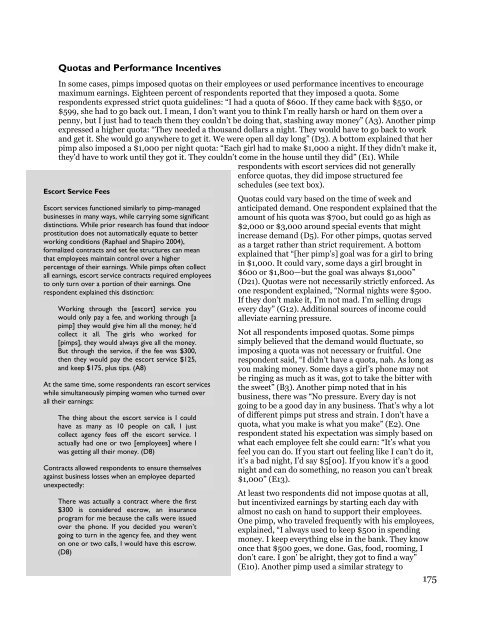413047-Underground-Commercial-Sex-Economy
413047-Underground-Commercial-Sex-Economy
413047-Underground-Commercial-Sex-Economy
You also want an ePaper? Increase the reach of your titles
YUMPU automatically turns print PDFs into web optimized ePapers that Google loves.
Quotas and Performance Incentives<br />
In some cases, pimps imposed quotas on their employees or used performance incentives to encourage<br />
maximum earnings. Eighteen percent of respondents reported that they imposed a quota. Some<br />
respondents expressed strict quota guidelines: “I had a quota of $600. If they came back with $550, or<br />
$599, she had to go back out. I mean, I don’t want you to think I’m really harsh or hard on them over a<br />
penny, but I just had to teach them they couldn’t be doing that, stashing away money” (A3). Another pimp<br />
expressed a higher quota: “They needed a thousand dollars a night. They would have to go back to work<br />
and get it. She would go anywhere to get it. We were open all day long” (D3). A bottom explained that her<br />
pimp also imposed a $1,000 per night quota: “Each girl had to make $1,000 a night. If they didn’t make it,<br />
they’d have to work until they got it. They couldn’t come in the house until they did” (E1). While<br />
respondents with escort services did not generally<br />
enforce quotas, they did impose structured fee<br />
schedules (see text box).<br />
Escort Service Fees<br />
Escort services functioned similarly to pimp-managed<br />
businesses in many ways, while carrying some significant<br />
distinctions. While prior research has found that indoor<br />
prostitution does not automatically equate to better<br />
working conditions (Raphael and Shapiro 2004),<br />
formalized contracts and set fee structures can mean<br />
that employees maintain control over a higher<br />
percentage of their earnings. While pimps often collect<br />
all earnings, escort service contracts required employees<br />
to only turn over a portion of their earnings. One<br />
respondent explained this distinction:<br />
Working through the [escort] service you<br />
would only pay a fee, and working through [a<br />
pimp] they would give him all the money; he’d<br />
collect it all. The girls who worked for<br />
[pimps], they would always give all the money.<br />
But through the service, if the fee was $300,<br />
then they would pay the escort service $125,<br />
and keep $175, plus tips. (A8)<br />
At the same time, some respondents ran escort services<br />
while simultaneously pimping women who turned over<br />
all their earnings:<br />
The thing about the escort service is I could<br />
have as many as 10 people on call, I just<br />
collect agency fees off the escort service. I<br />
actually had one or two [employees] where I<br />
was getting all their money. (D8)<br />
Contracts allowed respondents to ensure themselves<br />
against business losses when an employee departed<br />
unexpectedly:<br />
There was actually a contract where the first<br />
$300 is considered escrow, an insurance<br />
program for me because the calls were issued<br />
over the phone. If you decided you weren’t<br />
going to turn in the agency fee, and they went<br />
on one or two calls, I would have this escrow.<br />
(D8)<br />
Quotas could vary based on the time of week and<br />
anticipated demand. One respondent explained that the<br />
amount of his quota was $700, but could go as high as<br />
$2,000 or $3,000 around special events that might<br />
increase demand (D5). For other pimps, quotas served<br />
as a target rather than strict requirement. A bottom<br />
explained that “[her pimp’s] goal was for a girl to bring<br />
in $1,000. It could vary, some days a girl brought in<br />
$600 or $1,800—but the goal was always $1,000”<br />
(D21). Quotas were not necessarily strictly enforced. As<br />
one respondent explained, “Normal nights were $500.<br />
If they don’t make it, I’m not mad. I’m selling drugs<br />
every day” (G12). Additional sources of income could<br />
alleviate earning pressure.<br />
Not all respondents imposed quotas. Some pimps<br />
simply believed that the demand would fluctuate, so<br />
imposing a quota was not necessary or fruitful. One<br />
respondent said, “I didn’t have a quota, nah. As long as<br />
you making money. Some days a girl’s phone may not<br />
be ringing as much as it was, got to take the bitter with<br />
the sweet” (B3). Another pimp noted that in his<br />
business, there was “No pressure. Every day is not<br />
going to be a good day in any business. That’s why a lot<br />
of different pimps put stress and strain. I don’t have a<br />
quota, what you make is what you make” (E2). One<br />
respondent stated his expectation was simply based on<br />
what each employee felt she could earn: “It’s what you<br />
feel you can do. If you start out feeling like I can’t do it,<br />
it’s a bad night, I’d say $5[00]. If you know it’s a good<br />
night and can do something, no reason you can’t break<br />
$1,000” (E13).<br />
At least two respondents did not impose quotas at all,<br />
but incentivized earnings by starting each day with<br />
almost no cash on hand to support their employees.<br />
One pimp, who traveled frequently with his employees,<br />
explained, “I always used to keep $500 in spending<br />
money. I keep everything else in the bank. They know<br />
once that $500 goes, we done. Gas, food, rooming, I<br />
don’t care. I gon’ be alright, they got to find a way”<br />
(E10). Another pimp used a similar strategy to<br />
175


